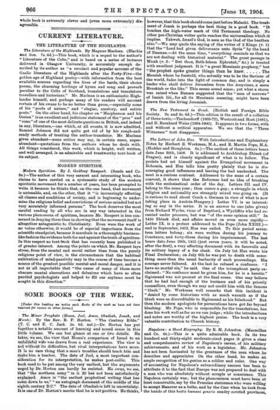The. Minor Prophets (Hosea, Joel, Amos, Obadiah, Jonah, and Micah).
By the Rev. R. F. Horton. "The Century Bible." (T. C. and E. C. Jack. 2s. 6d. net.)—Dr. Horton has put together a notable amount of learning and sound sense in this little volume. We can but glance at one or two details. He takes, we see, the view that Hosea's comparison of Israel to an unfalthfid wife was drawn from a real experience. The view is not without its difficulties, but rival interpretations have more. It is no rare thing that a man's troubles should teach hiin and make him a teacher. The date of Joel, a most important con- sideration for its interpretation, he makes post,exilic. This book used to be Put among the very earliest, but the arguments urged by Dr. Horton can hardly be resisted. He owns, we see, that "the northern army" in ii. 20 has not been satisfactorily extilailed. Amos is "the earliest prophetical writing that has come down to us," "an autograph document of the middle of the eighth century B.C." The date of Obadiah is left in uncertainty. It is one of Dr. Hortou's merits that he is not positive. He thinks, however, that this book should come just before Malachi. The treat- meat of Jonah is perhaps the best thing in a good book. "It touches the high-water mark of Old Testament theology. No other pre-Christian writer quite reaches the universalism which it implies. Yahweh, Israel's God, is seen as the God of the heathen also."—We may quote the saying of the writer of 2 Kings (v. 1) that the "Lord had given deliverance unto Syria" by the hand Of Naaman.—At the same time, "everything reminds us that we are not dealing with historical material." The great passage in Micah (v. 2: "But thou, Beth-lehem Ephratah," .kc.) is treated with excellent judgment. It is "a great Messianic prophecy," but "the prophet spoke greater things than he knew The Messiah whom he foretold, who actually was to be the Saviour of the world, fades into the light of common day, and is simply a leader who shall deliver Jerusalem from the Assyrians, a mere Ilezekiah or the like." This seems sound sense; yet what a storm was raised when Bunsen suggested that the "man of sorrows" of Isaiah liii., for all its Messianic meaning, might have been drawn from the living Jeremiah.






































 Previous page
Previous page